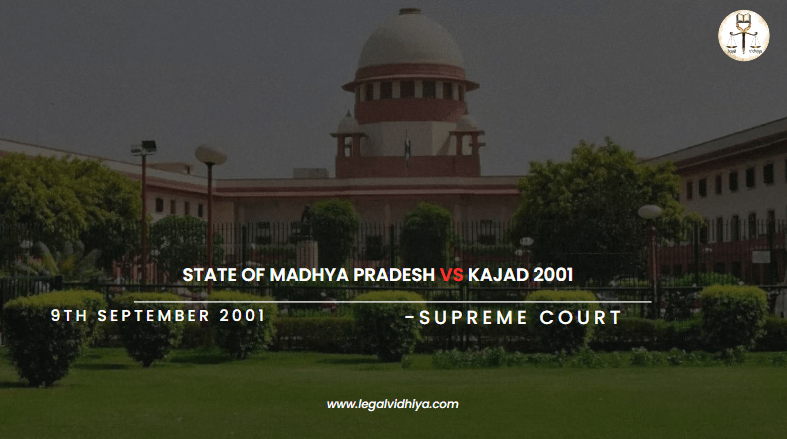
| CITATION | |
| DATE OF JUDGEMENT | 9TH SEPTEMBER 2001 |
| COURT | THE SUPREME COURT OF INDIA |
| APPELLANT | STATE OF MADHYA PRADASH |
| RESPONDENT | KAJAD |
| BENCH | M.B SHAH, R.P SETHI, JJ |
INTRODUCTION
State of Madhya Pradesh Vs. Kajad (2001) is a Supreme Court case dealing with the legal complexities of the Narcotic Drugs and Psychotropic Substances Act 1985 (NDPS Act). The case was related to the arrest of Kajad, who was caught with a significant amount of opium. Initially denied bail due to the strict provisions of Section 37 of the NDPS Act, which states that bail can only be granted in exceptional cases, Kajad was later granted bail by the High Court. The state challenged that decision and the Supreme Court ultimately ruled that the Court of Appeal erred in not strictly following the strict bail requirements of the NDPS Act.
FACTS OF THE CASE
- Acting on accurate information received from the Jawad Police Station, Jawad District, Neemuch, Madhya Pradesh, force was deployed and the accused was arrested on the night of 24 March 2000.
- After observing the mandatory provisions of Section 50 of the Substances Act, 1985. (“law”), opium weighs 7 kg. was taken by the accused which he kept in his bag. After completing the necessary procedural formalities and analysing the samples, the charge sheet of the accused was presented to the competent court.
- The district court rejected the defendant’s bail application. With his bail application rejected, the accused, the accused, presented a petition to the Supreme Court, which was registered as miscellaneous crime case number 2052 of 2000. The said petition was rejected by the order of the Supreme
- Court dated 5.6.2000. Without mentioning the change in circumstances, the accused-appellant filed a fresh petition in the Court of Appeal in August 2000, which was adjourned from time to time and finally allowed respect of the impugned order in this appeal.
ISSUE RAISED
Whether the Madhya Pradesh High Court’s decision to grant bail to Kajad complied with the strict bail conditions laid down in Section 37 of the Narcotic and Psychotropic Substances Act, 1985 (NDPS Act).
CONTENTION OF APPELLANT
- The state claimed that the High Court did not follow Section 37 of the NDPS Act, which sets strict conditions for granting bail in drug-related offences.
- Under Section 37, bail can only be granted if the court finds the accused not guilty and will not commit any further offences.
- Appellant noted that there was no material change in circumstances after the trial court defaulted on bail. The High Court’s decision to grant bail was considered arbitrary because it was not based on new evidence or developments.
- The State emphasized the seriousness of the crime, which involved the possession of a large amount of opium (7 kg), which posed a serious threat to public health and safety.
- They argued that releasing the accused on bail undermined the objective of the NDPS Act to curb drug trafficking.
- It was submitted that the High Court revised its earlier order denying bail without proper justification, which is not permissible under the Criminal Code. This was considered a procedural error.
CONTENTION OF RESPONDENT
- Defendant maintained that he fully cooperated with authorities and followed legal procedures during his arrest and subsequent investigation. His lawyer argued that his behaviour did not indicate a risk of recidivism or flight.
- The defence argued that the bail conditions set out in Section 37 were met, which indicated that the Supreme Court had correctly exercised its discretion in finding that Kajad was not necessarily guilty and was unlikely to be involved in a crime while on bail.
- Kajad’s lawyer emphasized his criminal record and argued that there was reason to believe he was not involved in habitual criminal activity.
- This clause used to argue that he should not be subject to strict bail requirements.
- The accused also argued that the High Court’s decision to grant bail was based on a fair assessment of the circumstances and was not a mere review of an earlier refusal to grant bail. They argued that the court’s discretion was properly exercised.
JUDGEMENT
State of Madhya Pradesh vs. Kajad (2001) challenged the decision of the Madhya Pradesh High Court granting bail to the accused Kajad under the Narcotic Drugs and Psychotropic Substances Act, 1985 (NDPS Act). The Supreme Court set aside the High Court’s decision to grant bail, citing that it did not comply with the strict bail provisions under Section 37 of the NDPS Act. The court confirmed that under Section 37 of the NDPS Act, bail can be granted for narcotic and psychotropic substance offenses only if two conditions are met: The accused must produce convincing evidence to show that he is not guilty of the crime. The court must be satisfied that the accused is not likely to commit further offenses while on bail. In State of Madhya Pradesh Vs. Kajad (2001) challenged the decision of the Madhya Pradesh High Court granting bail to the accused Kajad under the Narcotic Drugs and Psychotropic Substances Act, 1985 (NDPS Act). The Supreme Court set aside the High Court’s decision to grant bail, citing that it did not comply with the strict bail provisions under Section 37 of the NDPS Act. The court confirmed that under Section 37 of the NDPS Act, bail can be granted for narcotic and psychotropic substance offenses only if two conditions are met:
- The accused must produce convincing evidence to show that he is not guilty of the crime.
- The court must be satisfied that the accused is not likely to commit further offenses while on bail.
The Supreme Court criticized the High Court for failing to properly consider the seriousness of the offense and the fact that there had been no change in circumstances that would have warranted bail. The Supreme Court’s lenient approach in dealing with the bail application of an accused in a major drug case was considered inappropriate. It was noted that the Supreme Court did not sufficiently consider the objections presented by the state prosecutor to the application for bail, which is a mandatory requirement stipulated in section 37. The Supreme Court did not sufficiently consider the objections presented by the state prosecutor on the application of bail, which is a mandatory requirement stipulated in section 37. The judgment of the Supreme Court in State of Madhya Pradesh vs. Kajad confirmed the strict application of the Narcotic Drugs and Psychotropic Substances Act, 1985 (NDPS Act), especially in terms of bail provisions. The court concluded that the Madhya Pradesh High Court’s decision to grant bail to Kajad was flawed as it did not meet the strict requirements of Section 37 of the NDPS Act.
CONCLUSION
The court emphasized that courts must be careful and strictly follow the law when it comes to drug-related crimes, as they pose serious risks to society. The judgment emphasizes the role of the judiciary in supporting the implementation of the NDPS Act by maintaining strict bail requirements in such cases. This judgment is a critical precedent to ensure that bail decisions in drug cases are made with due regard to the legal framework, supporting the broader objectives of the NDPS Act to effectively combat drug addiction and drug trafficking.
REFRENCES
- https://indiankanoon.org/doc/1840468/.
- https://courtverdict.com/supreme-court-of-india/state-of-madhya-pradesh-vs-kajad.
This article is written by Avni Jain, a student of 6th semester of IILM University Gurugram, an intern under Legal Vidhiya.
Disclaimer: The materials provided herein are intended solely for informational purposes. Accessing or using the site or the materials does not establish an attorney-client relationship. The information presented on this site is not to be construed as legal or professional advice, and it should not be relied upon for such purposes or used as a substitute for advice from a licensed attorney in your state. Additionally, the viewpoint presented by the author is of a personal nature.




0 Comments